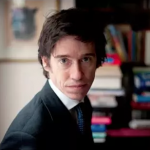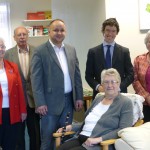THE INVENTORY: RORY STEWART
Article first published in The Financial Times by Hester Lacey on 22 October 2010.
Rory Stewart, 37, left the British Diplomatic Service to walk 6,000 miles from Turkey to Bangladesh. He has served as a coalition deputy governor in Iraq and has lived in Kabul, where he founded a charity. He was elected MP for Penrith and the Border this year.
What was your earliest ambition?
I wanted to be Tarzan, then Indiana Jones, then Lawrence of Arabia. The energy went out of the project at some point. I began to realise that Lawrence’s achievements came at an incredible psychological and personal cost. Even if I’m never as great as he is, with any luck I might be happier.
Public school or state school?
University or straight into work? Eton and Balliol. It wasn’t until I was 26 or 27, walking alone for 21 months, that I was able to work out who I was, what I cared about and what I thought. University is enormously worthwhile but I don’t feel that, at 18, I was as ready for it as I could have been.
Who is your mentor?
My father. I can discuss almost anything with him.
How physically fit are you?
Pretty fit, mostly for walking.
Ambition or talent: which matters more to success?
Imagination.
Have you ever taken an IQ test?
When I was a child. My mother was proud of the result – she put me in Mensa.
How politically committed are you?
Politics is all-encompassing, but moments are really fulfilling. You have a relation with your constituents that doesn’t exist in any other kind of job. People have voted for you, you have an obligation to them, and, as an elected member of Parliament, you are driven by communities and you can represent them powerfully.
Do you consider your carbon footprint?
I travel more by foot and bicycle than some people, and I plant a lot of trees, but there’s a strong element of self-fulfilment mixed into that.
Do you have more than one home?
I have a home in my constituency and one in London. London is almost 300 miles from my constituency so I need somewhere to sleep. I guess I could pitch a tent on Parliament Green.
What would you like to own that you don’t currently possess?
A dog.
What’s your biggest extravagance?
Fresh leaf tea.
In what place are you happiest?
High on a mountain slope in the sunshine.
What ambitions do you still have?
To be more patient.
What drives you on?
I’m very motivated by trying to link individuals, particularly in Cumbria, to the abstractions of policy in Westminster. What drives me is that attempt to try to connect rhetoric with reality.
What is the greatest achievement of your life so far?
My work with the Turquoise Mountain charity in Afghanistan. I went out very sceptical and found myself still there three years later. The team has grown from one person – me – to over 600. It has been working with the community in an incredibly beautiful but damaged part of Kabul’s old city.
What has been your greatest disappointment?
I haven’t grown up as quickly as I’d like. And, before I went into politics, I had 18 months where I wanted to write another book and I never did. I’ve lost that time now.
If your 20-year-old self could see you now, what would he think?
That I was a bit tired, that I’d compromised too much, that my life had been less sharp, less dramatic than he would have liked.
If you lost everything tomorrow, what would you do?
Start walking across Burma and writing.
Do you believe in assisted suicide?
No. I don’t want to judge and there are times that we have to be understanding. But the basic idea that it’s not legal to kill other people is right.
If you had to rate your satisfaction with your life so far, out of 10, what would you score?
9.7.






